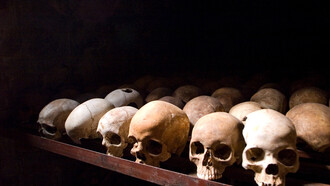The two friends, one African American and the other Irish American, both over 70, follow all of the social distancing rules as they settle into an afternoon of sharing stories and good Irish whiskey. They meet once a week to talk about their lives since Covid-19 and to get inspiration for each other’s writing. The African American has come to love the smoothness of Tullamore Dew, which they refer to as “DEW”, and the Irish American the peace and serenity of her friend’s small secret garden.
As they talk, their blessings are unveiled, both continue to buy organic foods, and even can afford a $27 bottle of Irish whiskey, they have no mortgages, receive their monthly Social Security checks and have the benefit of their socialized medicine, (oops!) Medicare. They congratulate each other on sending checks and taking food to the local food pantry. But when the silence comes, in the depths of their souls, they shed tears as they come to terms with one of America’s great myths. They realize that Covid-19 has revealed a truth about American society, its class system and the misery now suffered by its “expendable” class.
The “expendable” class in this article is distinguished from the “frontline” and “essential” workers in which they are usually grouped. While frontline/essential medical, emergency and law enforcement workers have chosen to work in professions that come with inherent health and safety risks, the expendable class is not prepared nor protected in the same way. The expendable class of which this article speaks, refers to those who work in low-wage jobs, sometimes holding two or more jobs, without the benefit of healthcare and who many times must depend upon food stamps to feed their families. The expendable class work as clerks in stores, wait staff in restaurants, transportation workers, house cleaners, nannies and the like.
While the society and the economic system in the United States unravel, there are those in the “secure” class whose lives go on with just the “inconveniences” of being forced to cocoon at home, to practice social distancing and to wear face masks. The secure class includes those like the friends mentioned above, both retired and capable of having basic needs of food, shelter, health care and safety met despite the pandemic. This class also includes those who can work from home, and even those who still have jobs but do not have to place themselves in danger of being infected with Covid-19.
Most critically, “choice” divides the secure from the expendable class. Those in the secure class, have the option or whether or not to place themselves at risk of the virus; they can choose the spaces in which they will go, be it church, the beach, restaurant or the local bar. Those in the expendable class because of financial necessity are forced to go into work environments in which they are constantly exposed to the danger of the virus and where in many cases they are not fully protected. The expendable class cannot afford to stay at home with their children and must place themselves and their families at great risk.
Speaking of children, the children of the expendable class are also expendable. These children are at a distinct disadvantage during this trying period. They will be forced back into “brick and mortar” schools while the children and grandchildren of the secure class will have tutors or join pods of learners whose parents can afford not to expose them to the dangers of crowded classrooms. While valid psychosocial and academic reasons have been bandied about for the return of children to school in the fall, the reason for the return of children whose parents belong to the expendable class exposes another huge crack in America’s economic system. The children of the expendable class must return so they will again be able to eat nutritious meals.
Reports indicate that more than30 million American children participate in the free or reduced-price lunch (FRPL) and more than 14 million in the free or reduced-price breakfast under the School Breakfast Program (SBP). During the past months of school closing due to Covid-19, the parents of these children have experienced additional and greater strains on their already limited financial resources.
This situation is almost unreal to grasp: how is it possible that parents work one or more jobs and are still unable to adequately feed their children? Why must the children of the expendable class be placed in danger so as not to starve until more is learned about this pandemic?
As we go forward, will Covid-19 bring Americans to a new level of empathy and compassion? Will the secure class come to respect those who serve them in ways different from writing checks and giving items to food pantries? Will Americans demand that no man, woman or parent be forced to place themselves or their families in danger of falling ill to the virus in order to eat and pay rent?
In a moral human sense, will the spirits of Americans be so unsettled by the current conditions under which many Americans find themselves, that they will no longer allow the members of the expendable class to make so little money their children will face hunger because a school is closed? Will Covid-19 make Americans realize that the condition of some of its citizens mimics that of a Third World country more than one that boasts of its exceptionality and has been called the wealthiest country in the history of the world?















